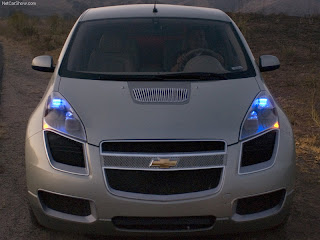General Motors announced a driveable version of the most technologically advanced automobile ever built - the Chevrolet Sequel, GM's solution to provide the world with a cleaner, petroleum-free vehicle that is better in nearly every way.
"General Motors is proving that advanced technology can remove the automobile from the environmental debate and reduce our dependence on petroleum," said Larry Burns, GM vice president, research & development and strategic planning. "Chevy Sequel clearly shows that our vision for the future of the automobile is real and sustainable."
Sequel was introduced in 2005 at the North American International Auto Show in Detroit. It is the first vehicle in the world to successfully integrate a hydrogen fuel cell propulsion system with a broad menu of advanced technologies such as steer-and brake-by-wire controls, wheel hub motors, lithium-ion batteries and a lightweight aluminum structure. It uses clean, renewable hydrogen as a fuel and emits only water vapor.
"Sequel fundamentally changes the DNA of today's automobiles … exchanging an internal combustion engine, petroleum and mechanical systems for fuel cell propulsion, hydrogen and electrical systems," Burns said. "In Sequel, GM has created a real vehicle that promises to excite customers and lead to long-term, sustainable automotive transportation."
Compared to other fuel cell vehicles, Sequel has an unprecedented range of 300 miles between fill-ups and spirited acceleration, attaining 60 mph in just 10 seconds. Sequel also has all the amenities one would expect in a premium, five-passenger crossover SUV, including impressive styling, a spacious interior and an all-aluminum body and structure designed to meet all applicable Federal Motor Vehicle Safety Standards. It has a low-profile, skateboard-like chassis that houses all of its main propulsion, braking and chassis components.
"Sequel is a vehicle that is better in nearly every way - quicker, more sure-footed, easier to handle, easier to build and better looking, while being safe and emitting only water vapor," said Burns.
Other benefits include:
+ Unequaled control on snow and ice, or uneven terrain
+ 70-percent more torque for unparalleled acceleration
+ Shorter braking distances
+ Ability to "talk" to other vehicles about traffic congestion or road conditions
"Four years ago, our chairman and CEO, Rick Wagoner, challenged us to completely rethink the automobile," Burns said. "With the Chevy Sequel, we have now met Rick's challenge by reinventing the automobile and making it real. We've proven a new DNA for vehicles that is viable for the future."
"General Motors is proving that advanced technology can remove the automobile from the environmental debate and reduce our dependence on petroleum," said Larry Burns, GM vice president, research & development and strategic planning. "Chevy Sequel clearly shows that our vision for the future of the automobile is real and sustainable."
Sequel was introduced in 2005 at the North American International Auto Show in Detroit. It is the first vehicle in the world to successfully integrate a hydrogen fuel cell propulsion system with a broad menu of advanced technologies such as steer-and brake-by-wire controls, wheel hub motors, lithium-ion batteries and a lightweight aluminum structure. It uses clean, renewable hydrogen as a fuel and emits only water vapor.
"Sequel fundamentally changes the DNA of today's automobiles … exchanging an internal combustion engine, petroleum and mechanical systems for fuel cell propulsion, hydrogen and electrical systems," Burns said. "In Sequel, GM has created a real vehicle that promises to excite customers and lead to long-term, sustainable automotive transportation."
Compared to other fuel cell vehicles, Sequel has an unprecedented range of 300 miles between fill-ups and spirited acceleration, attaining 60 mph in just 10 seconds. Sequel also has all the amenities one would expect in a premium, five-passenger crossover SUV, including impressive styling, a spacious interior and an all-aluminum body and structure designed to meet all applicable Federal Motor Vehicle Safety Standards. It has a low-profile, skateboard-like chassis that houses all of its main propulsion, braking and chassis components.
"Sequel is a vehicle that is better in nearly every way - quicker, more sure-footed, easier to handle, easier to build and better looking, while being safe and emitting only water vapor," said Burns.
Other benefits include:
+ Unequaled control on snow and ice, or uneven terrain
+ 70-percent more torque for unparalleled acceleration
+ Shorter braking distances
+ Ability to "talk" to other vehicles about traffic congestion or road conditions
"Four years ago, our chairman and CEO, Rick Wagoner, challenged us to completely rethink the automobile," Burns said. "With the Chevy Sequel, we have now met Rick's challenge by reinventing the automobile and making it real. We've proven a new DNA for vehicles that is viable for the future."






















No comments:
Post a Comment